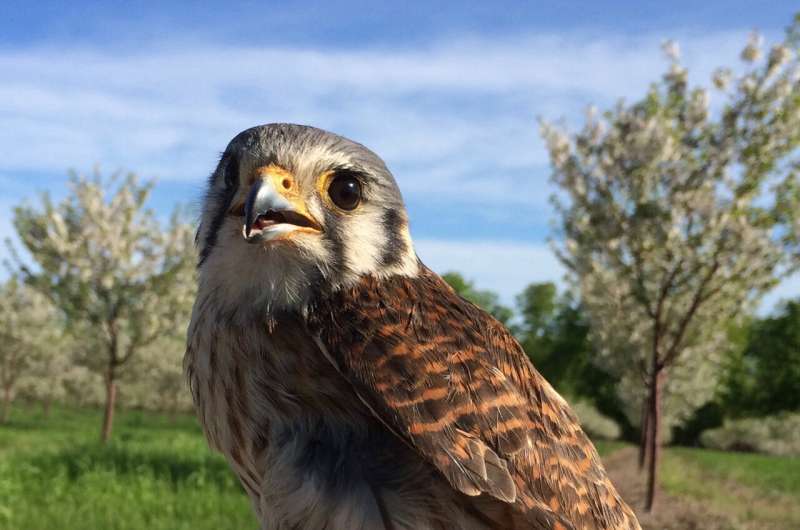Science
Michigan Cherry Farmers Harness Kestrels for Crop Protection

Cherry farmers in northern Michigan are looking to the skies for a unique solution to their ongoing bird problem. New research from Michigan State University has unveiled that the American kestrel, the smallest falcon in the United States, may not only safeguard crops from birds that feed on cherries but also enhance food safety.
The study, published on November 27, 2025, in the Journal of Applied Ecology, highlights how kestrels can deter smaller birds, thereby reducing crop damage and the risk of contamination from bird droppings. Lead author Olivia Smith remarked on the kestrel’s impressive aerial behavior, noting, “They hover in midair as they scan the ground below for insects, mice, and small birds.”
Farmers have long grappled with the challenge of protecting their crops from birds, which can cause losses ranging from 5% to 30% annually, depending on the region. Traditional deterrents like nets and noisemakers can be costly and ineffective. In contrast, the presence of kestrels has proven to be a more efficient alternative.
Kestrels as Natural Predators
The research involved installing nest boxes in eight cherry orchards in northern Michigan to attract kestrels. The findings indicated that the presence of these birds of prey significantly reduced the number of fruit-eating birds, such as robins and starlings, in the orchards. Kestrels were associated with a more than tenfold decrease in potential cherry damage.
Moreover, the study revealed a substantial reduction in bird droppings on cherry trees. Kestrels contributed to a threefold decrease in the incidence of droppings found on branches, which is critical for maintaining food safety. As Catherine Lindell, a senior author and associate professor emerita, explained, “Certainly, kestrels poop too, but the number of fruit-eating birds they keep out of an orchard more than makes up for it.”
The research team conducted DNA analysis of bird droppings, discovering that approximately 10% contained Campylobacter, a bacterium associated with foodborne illnesses. While the study does not establish a direct link between cherry consumption and illness, it underscores the potential benefits of kestrels in minimizing contamination risks.
Implications for Food Safety
While the results are promising, researchers caution that relying solely on kestrels is not a panacea for all bird-related issues. The effectiveness of kestrels can vary by region, and their presence cannot eliminate all risks associated with wild birds. Nevertheless, the study suggests that they could be a valuable addition to farmers’ bird management strategies.
“This won’t solve all the bird problems farmers face,” Smith noted, emphasizing the importance of integrating multiple approaches to crop protection. However, she highlighted that kestrels provide a low-cost, low-maintenance tool for growers.
The implications of this research extend beyond cherry farming. While the focus has been on cherries, the findings suggest that kestrels could also be beneficial in crops historically linked to foodborne illness outbreaks, such as leafy greens. Smith concluded, “They’re really good at keeping the amount of poop down. That means fewer opportunities for transmission.”
As the cherry harvest season concludes, farmers in Michigan are optimistic about the potential role of kestrels in safeguarding their crops next spring. This innovative approach not only addresses immediate agricultural challenges but also promotes safer food production practices in the long term.
-

 Lifestyle4 months ago
Lifestyle4 months agoLibraries Challenge Rising E-Book Costs Amid Growing Demand
-

 Sports4 months ago
Sports4 months agoTyreek Hill Responds to Tua Tagovailoa’s Comments on Team Dynamics
-

 Sports4 months ago
Sports4 months agoLiverpool Secures Agreement to Sign Young Striker Will Wright
-

 Lifestyle4 months ago
Lifestyle4 months agoSave Your Split Tomatoes: Expert Tips for Gardeners
-

 Lifestyle4 months ago
Lifestyle4 months agoPrincess Beatrice’s Daughter Athena Joins Siblings at London Parade
-

 World4 months ago
World4 months agoWinter Storms Lash New South Wales with Snow, Flood Risks
-

 Science3 months ago
Science3 months agoSan Francisco Hosts Unique Contest to Identify “Performative Males”
-

 Science4 months ago
Science4 months agoTrump Administration Moves to Repeal Key Climate Regulation
-

 Business4 months ago
Business4 months agoSoFi Technologies Shares Slip 2% Following Insider Stock Sale
-

 Science4 months ago
Science4 months agoNew Tool Reveals Link Between Horse Coat Condition and Parasites
-

 Sports4 months ago
Sports4 months agoElon Musk Sculpture Travels From Utah to Yosemite National Park
-

 Science4 months ago
Science4 months agoNew Study Confirms Humans Transported Stonehenge Bluestones









